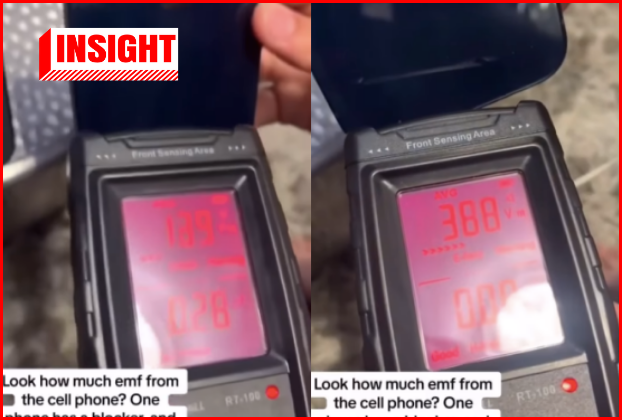
In recent years, concerns about electromagnetic fields (EMFs) emitted by electronic devices, particularly mobile phones, have led to the development of various products claiming to shield users from these radiations.
One such product is the EMF shield magnet, which promises to reduce exposure to harmful EMF radiation. But do these magnets actually work? Let’s dive into the detail.
Social Media Claim
An Instagram video showcases the “EMF Shield” product, suggesting that it can effectively protect against dangerous EMF radiation, with the caption “, Watch how much EMF radiation is being emitted from a phone without an EMF blocker.”
The post has garnered significant attention, amassing over 2,000 likes so far. The same reel was also shared among Facebook users, as seen here. With a lot of interest in the topic, we’ve decided to investigate this claim further.
ALSO READ: The Widely-Shared Picture About The Dangers Of Bluetooth Headphones Doesn’t Have Enough Proof
What are Electromagnetic Fields (EMFs)?
Electromagnetic fields, or EMFs, are types of waves that are emitted by anything that uses electricity. This encompasses various everyday items, including household appliances like microwave ovens, personal devices such as mobile phones, and even larger equipment like computers.
These fields are created whenever electric current is present, meaning they are ubiquitous in our modern, technologically-driven lives.
Simply put, exposure to EMF waves is almost inevitable in today’s modern life. But are they entirely safe for humans?
Types and Effects of EMF Exposure
Electromagnetic fields (EMFs) span across the electromagnetic spectrum. High-energy radiation, such as x-rays and gamma rays, can ionise atoms, which may harm DNA and cells. Conversely, low-energy radiation, like extremely low-frequency (ELF) radiation, doesn’t ionize atoms and is generally deemed safe.
According to Healthline, cell phones emit non-ionizing radiofrequency radiation, which is on the lower end of the electromagnetic spectrum. Currently, there is no definitive scientific evidence that links cell phone use to adverse health problems. However, some experts recognise the necessity for further research to explore this area more comprehensively.
EMFs’ Potential Impact on Human Health
The National Institute for Environmental Health Sciences (NIEHS) also states that more research is needed to determine if EMFs harm human health.
While some studies have linked high exposure to radiofrequency radiation (used in 2G and 3G cellphones) to cancerous tumours in rats, these results aren’t directly comparable to human cellphone usage. The institute also commented that there isn’t a conclusive link between cell phone use and adverse health problems, but research is still ongoing.
The World Health Organization (WHO) provides clear information about how much radiation we’re exposed to from cell phones, what health problems this could cause, and guidelines to follow. They say cell phone radiation is a Group 2B agent, which means it might possibly be carcinogenic to humans, yet this group does not confirm a definite risk.
The U.S. Food and Drug Administration (FDA) states that cell phones emit low levels of non-ionizing radiation. Although they continue to monitor research, they have not found definitive evidence of harm.
However, a 2015 study about The effect of low-frequency electromagnetic field on human bone shows that certain types of electromagnetic fields (EMF) can help human bone marrow cells and skeletal stem cells grow and change, making them more useful in healing and tissue building. EMF impacts how ions and signaling molecules behave, which affects gene activity, cell development, and transformation. Specific EMF levels can improve how well stem cells stick, multiply, change, and survive. But, these effects can change based on the EMF level, strength, and exposure time, as well as the testing and environmental conditions.
Does the “Shield” Really Protect You from the Radiation?
According to an article by WIRED, “Do These Gadgets Actually Protect You? We Asked the Experts“, there is a scientific consensus that low-powered magnets and similar products do not reliably guard against EMF radiation. The Federal Trade Commission (FTC) has acted against companies making false claims about EMF protection. They also state that anti-radiation “shields” could disrupt a phone’s signal, causing it t0 at times emit more radiation as it tries to find service.
Many products claiming to protect against EMF (Electromagnetic Field) like special clothes, cases, and chips might not work as advertised. In fact, they could increase your exposure to EMF. If you want to protect yourself, it’s better to keep distance from EMF sources. For example, don’t keep your phone on when it’s close to your body, or limit your use of strong WiFi. Anti-radiation phone cases and laptop shields might not give you enough protection and could even increase your exposure to radiation in some areas. If you’re worried about radiation, you can limit your phone use, use speaker mode, and keep your phone farther away from you.
Follow us and stay up to date with our latest fact checks.
Facebook | Twitter | Instagram | LINE | TikTok | WhatsApp

Title:The Truth About EMF Shield Products: Do They Really Work?
Written By: Fact Crescendo TeamResult: Insight






